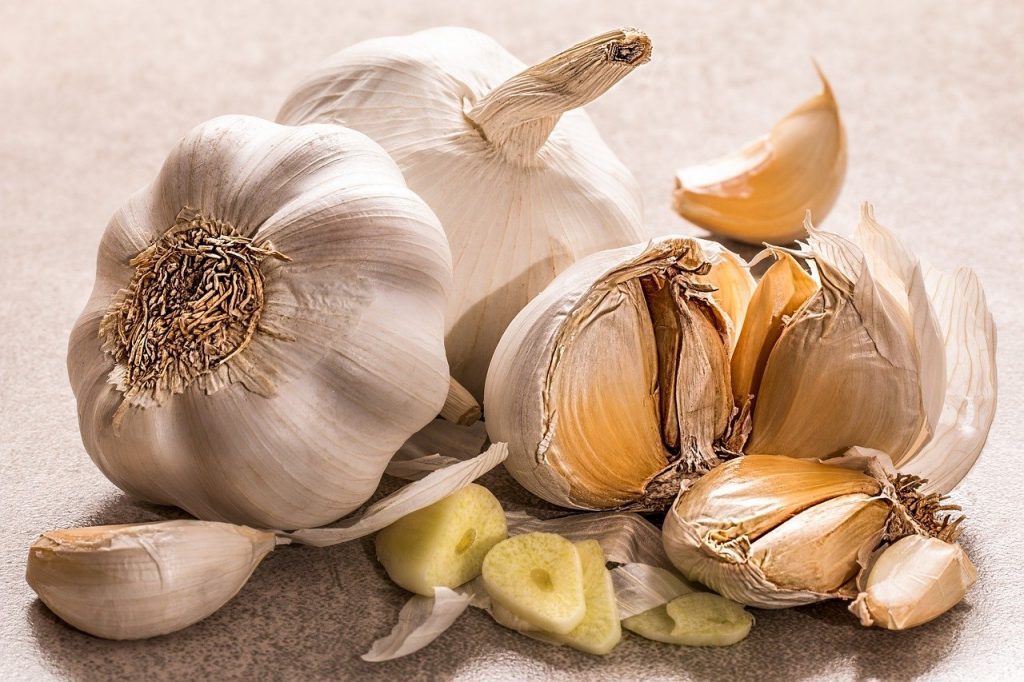
Just been diagnosed with gout and wondering if garlic should still be part of your diet? Here you’ll discover that, not only is garlic perfectly safe in your gout diet, it may actually help your gout. But there are some issues with garlic that can make it problematic for some.
Garlic and Gout
Garlic (Allium sativum) is part of the onion family and, although it’s botanically a vegetable (not a herb), is mostly used as a flavor enhancer, rather than being the hero of the dish.
Apart from its wonderful flavor it’s also been used for thousands of years as a medicine. Even today it’s thought that garlic may have numerous health benefits, with some studies suggesting that garlic may help to:
- support immune function
- lower blood pressure
- reduce blood clotting
- lower cholesterol
- reduce inflammation
- lower blood sugar
- protect against atherosclerosis
- protect against diabetes
- prevent common colds
- treat respiratory infections
- fight bacteria, viruses, and fungi
- reduce the risk of heart attacks
- lower the risk of brain, prostate and lung cancers
Garlic is highly nutritious: it’s rich in vitamins and minerals, such as B1 (thiamin), B2 (riboflavin), B5 (pantothenic acid), B6 (pyridoxine), C (ascorbic acid), manganese, selenium, calcium, phosphorus, copper, potassium, and iron. And it’s low in calories, fat, sugar, and sodium.
However, many of its potential health benefits are believed to come from its major active component, allicin, a sulfur compound that gives garlic its distinctive aroma and taste.
Is Garlic Good for Gout?
The root cause of gout is unusually high uric acid levels in the blood, a condition known as hyperuricemia. If it persists, tiny crystals of monosodium urate form out of the acid and settle in the joints and associated tissue. The body’s natural inflammatory response to these crystals then causes the particular joint area to flare-up painfully.
Uric acid, itself, is a product of purine metabolism in the body. Purines are natural chemical compounds found in our body’s cells and in the food we eat.
Around thirty percent of the uric acid produced in our body comes from the food we eat so we gout sufferers have to be very careful which foods we consume and in what quantities.
But sugar can also help to raise uric acid levels so we need to be mindful of that too.
Let’s take a look at garlic’s purine and sugar content…
Garlic is a low-purine food meaning that it produces less than 100 mg of uric acid per 3.5 oz (100 g) serving.
And it’s very low in sugar and has a low glycemic load.
So garlic is safe to eat with gout.
In fact, it may even help your gout…
Garlic has natural anti-inflammatory properties which may help during a gout flare.
It may also aid in eliminating uric acid from the body thus helping to reduce uric acid levels in the bloodstream.
The only thing is, it’s normally eaten in such very small quantities that it’s use as a natural gout remedy is somewhat limited, unless it’s eaten in larger quantities.
And this may be a problem for some because, although garlic is generally safe to eat, there are some concerns with it, especially when consumed in large amounts…
Garlic Concerns
It can amplify the effects of blood thinners and cause internal bleeding. So if you’re on blood-thinning medication (including aspirin) talk to your doctor before consuming garlic.
Pregnant women should avoid garlic as it may induce labor. And nursing mothers should avoid it as it alters the milk’s taste.
It can also have side effects, such as heartburn, bloating and gas, nausea, vomiting, and diarrhea, especially when eaten raw.
How to Eat Garlic
- Add to soups, stews, pasta, rice, sauces, and salads, etc.
- Eat one raw garlic clove per day.
- You can even make garlic water and garlic tea…
But always be mindful of the concerns previously outlined.
One of my favorites is to spread a crushed raw garlic clove over bread or toast, then add olive oil, chopped tomatoes and a pinch of sea salt. Delicious!
Closing Remarks
Garlic is safe to eat in a gout diet and may even be able to help lower uric acid and reduce inflammation.
And it has numerous health benefits particularly around immune system and heart health, and its antibacterial, antiviral, and antifungal properties.
But, although garlic in moderation is generally safe for most healthy adults, those on blood-thinners and pregnant and nursing mothers should avoid it or, at the very least, consult with their doctor before consuming it.



